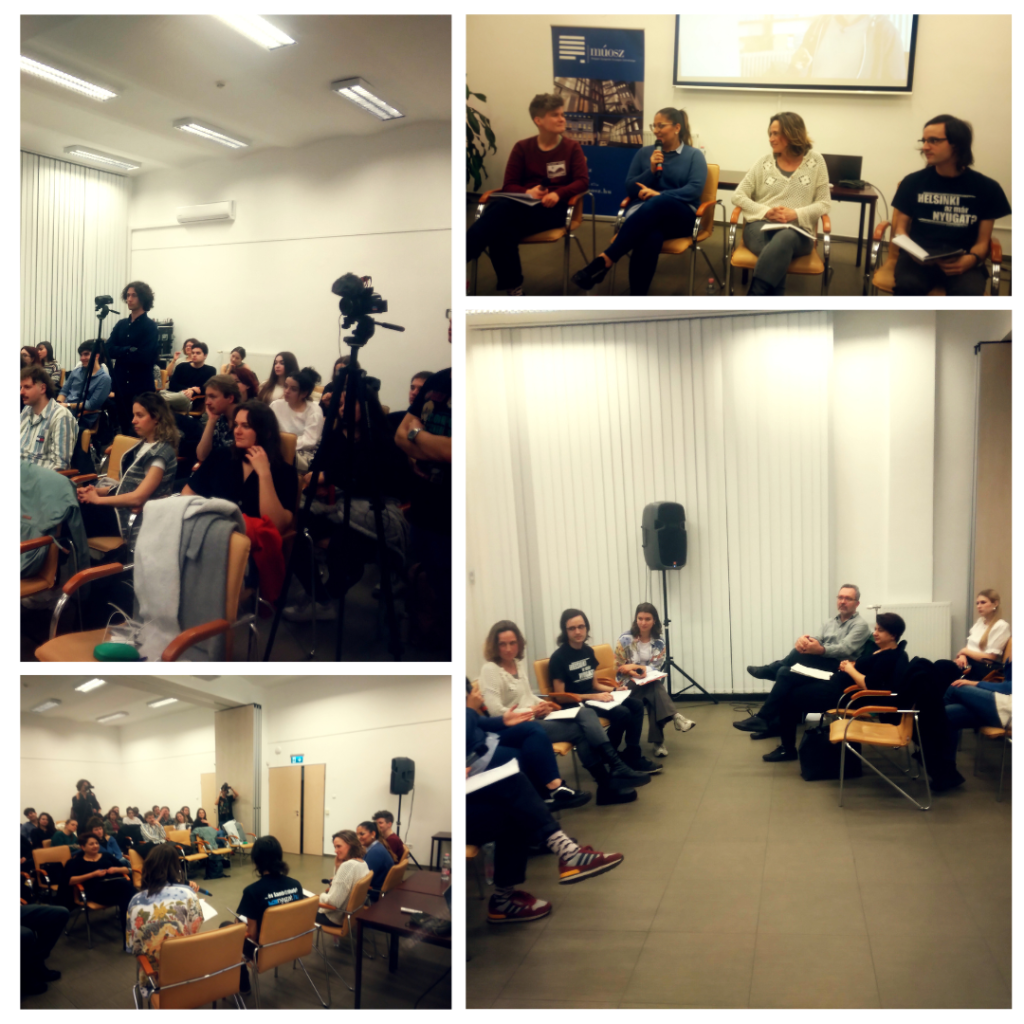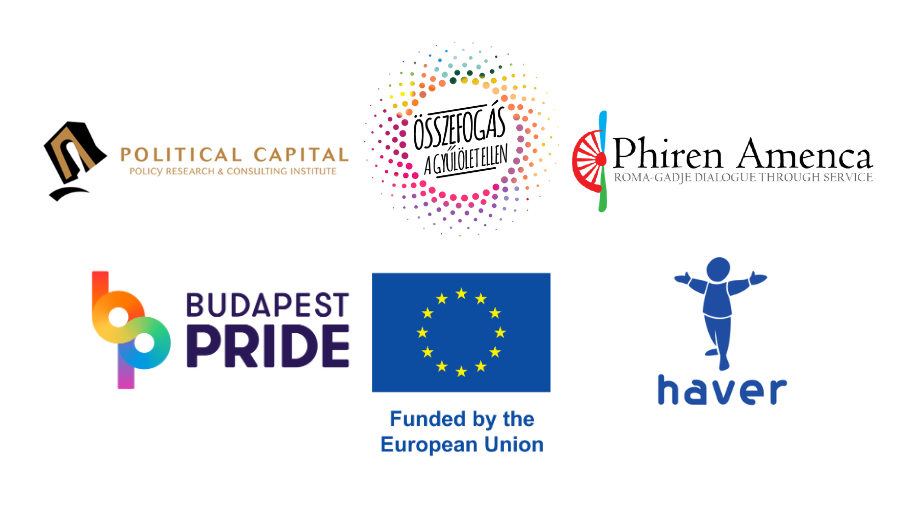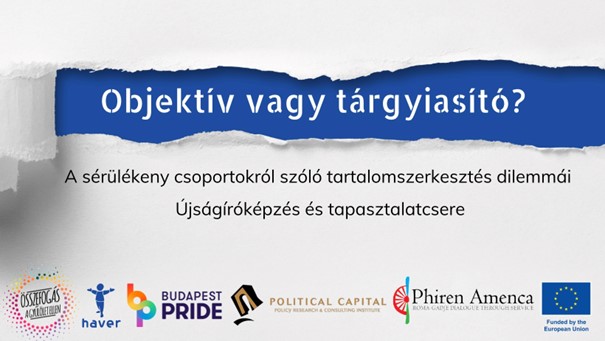The dilemmas of creating content about vulnerable groups
(Görgess a magyar nyelvű összefoglalóhoz)
A training event for future journalists, and a roundtable discussion with practicing journalists and experts were held on the 28th of February in Budapest in cooperation with the Romakép Műhely, Department of Media and Communication of ELTE University, and the National Association of Hungarian Journalists (MÚOSZ).
The workshop aimed to equip future journalists with practical knowledge on topics related to vulnerable groups. During the day the students had the opportunity to discuss the challenges and questions of the media representations of the Roma, Jewish and migrant and refugee people and the LGBT+ community.
After the welcoming words of the organizers, the workshop facilitators introduced the aim and the program of the workshop. In the first session some short movies were screened that were previously selected by organizations who are working with the different communities (namely Budapest Pride, Haver Foundation, Menedék Association and Phiren Amenca). The chosen movies were created with ‘good intention’, meaning they were not made to create more prejudices against certain groups, however, they conveyed stereotypical images unconsciously.
The selected videos can be found here: https://www.youtube.com/watch?v=Srw_SEI8ljs
After the screening the students discussed the movies in small groups. Each group got one short film and they had to discuss what they think about them, what would have made it better, including narration, image composition, and editing. After the small group discussions, each group presented their case and it was followed by an open debate.

Following the coffee break, an engaging roundtable discussion commenced, featuring esteemed guests such as human rights activist and lawyer Bea Bodrogi, psychologist and journalist Domi Milanovich, and journalist Adrienn Rézműves Balogh. Facilitated by dedicated students who volunteered for this role, the discussion began with each guest sharing their personal insights on the screened movies.
They eloquently highlighted what they perceived as the most concerning aspects of the films, encompassing elements such as the selection of individuals featured, the accompanying music, the editing techniques employed, and even the journalistic approach and narrative structure. Their contributions provided valuable perspectives on how the media represents disadvantaged minorities and marginalized groups, alongside offering constructive suggestions for improvement.
Among their recommendations were the establishment of ethical committees within media organizations and a supervisory body overseeing journalistic practices. They also advocated for professional training courses focused on minority representation and emphasized the importance of involving community representatives both during the production of such films and as experts on relevant topics.
Overall, the roundtable discussion served as a platform for insightful dialogue and fruitful exchange, reflecting a collective commitment to enhancing the portrayal of vulnerable communities in media narratives.
The recording of the roundtable discussion can be viewed here (in Hungarian): https://www.youtube.com/watch?v=ODWvPzAuNL0
OBJEKTÍV VAGY TÁRGYIASÍTÓ?
A kiszolgáltatott csoportokról szóló tartalomszerkesztés dilemmái
Február 28-án Budapesten, a Romakép Műhely, az ELTE BTK Média és Kommunikáció Tanszék és a Magyar Újságírók Országos Szövetsége (MÚOSZ) együttműködésében leendő újságírók számára tartottunk képzést, valamint kerekasztal-beszélgetést gyakorló újságírókkal és szakértőkkel.
A képzés célja az volt, hogy a leendő újságírók gyakorlati ismereteket szerezzenek a kiszolgáltatott csoportokkal kapcsolatos témákban. A nap folyamán a hallgatóknak lehetőségük volt megvitatni a romák, a zsidók, a migránsok és menekültek, valamint az LMBTQ+ közösség médiareprezentációjának kihívásait és kérdéseit.
A szervezők üdvözlő szavai után a workshop vezetői bemutatták a foglalkozás célját és programját. Az első részben néhány rövid filmet, tudósítást, riportot vetítettek le, amelyeket előzetesen a különböző közösségekkel foglalkozó szervezetek (nevezetesen a Budapest Pride, a Haver Alapítvány, a Menedék Egyesület és az RGDTS) választottak ki. A kiválasztott filmek “jó szándékkal” készültek, vagyis nem azért, hogy még több előítéletet keltsenek bizonyos csoportokkal szemben, azonban tudattalanul is sztereotip képeket közvetítettek.
A kiválasztott videók itt találhatók: https://www.youtube.com/watch?v=Srw_SEI8ljs
A vetítés után a diákok kis csoportokban megvitatták a filmeket. Minden csoport kapott egy-egy rövidfilmet, és meg kellett beszélniük, hogy mit gondolnak róluk, mitől lett volna jobb, beleértve a narrációt, a képkompozíciót és a vágást. A kiscsoportos megbeszélések után minden csoport bemutatta az eredményeit, majd ezt nyílt vita követte.
A kávészünetet követően egy izgalmas kerekasztal-beszélgetés kezdődött, amelyen olyan elismert vendégek vettek részt, mint Bodrogi Bea emberi jogi aktivista és jogász, Milanovich Domi pszichológus és újságíró, valamint Rézműves Balogh Adrienn újságíró. A beszélgetés, amelyet önként jelentkező, elkötelezett diákok moderáltak, azzal kezdődött, hogy minden vendég elmondta személyes meglátásait a vetített filmekről.
Kiemelték a videók általuk legérdekesebbnek vélt aspektusait, olyan elemeket felölelve, mint a megszólaltatott személyek kiválasztása, a kísérőzene, az alkalmazott vágási technikák, valamint az újságírói megközelítés és a narratív struktúra. Hozzászólásaik értékes szempontokat nyújtottak arról, hogy a média hogyan ábrázolja a hátrányos helyzetű kisebbségeket és marginalizált csoportokat, emellett pedig konstruktív javaslatokat tettek a javításra.
Ajánlásaik között szerepelt etikai bizottságok létrehozása a médiaszervezeteken belül, valamint az újságírói gyakorlatot felügyelő szerv létrehozása. Szorgalmazták továbbá a kisebbségek képviseletére összpontosító szakmai továbbképzéseket, és hangsúlyozták a közösségi képviselők bevonásának fontosságát mind az ilyen filmek készítése során, mind pedig a releváns témák szakértőiként.
Összességében a kerekasztal-beszélgetés az elmélyült párbeszéd és a gyümölcsöző eszmecsere platformjaként szolgált, amely a kiszolgáltatott közösségek médianarratívákban való ábrázolásának javítása iránti közös elkötelezettséget tükrözte.
A kerekasztal-beszélgetés felvétele itt tekinthető meg (magyar nyelven): https://www.youtube.com/watch?v=ODWvPzAuNL0.

The „CHAD – Countering Hate Speech and Hurtful Speech against Diversity: Roma, LGBTIQ, Jewish and Migrant Communities” project (project nr. 101049309) is funded by the Citizens, Equality, Rights and Values Programme (CERV) of the DG Justice, European Commission and coordinated by RGDTS Nonprofit Llc. in partnership with Haver Informal Educational Foundation, Rainbow Mission Foundation and Political Capital. Views and opinions expressed are however those of the author(s) only and do not necessarily reflect those of the European Union or the Citizens, Equality, Rights and Values Programme. Neither the European Union nor the granting authority can be held responsible for them.


